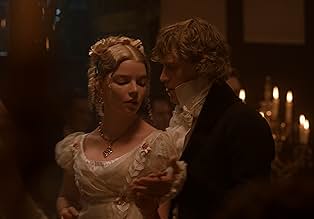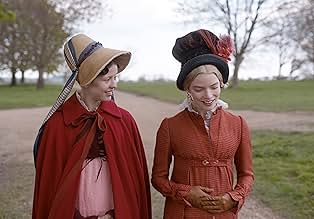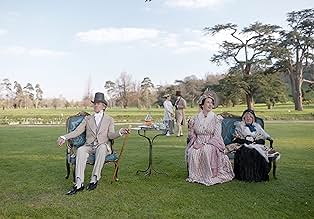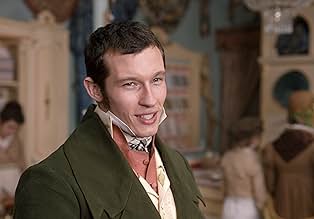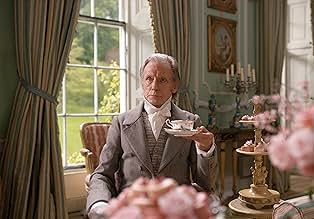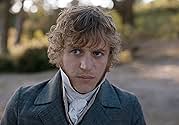En la Inglaterra del siglo XIX, una joven bien intencionada pero egoísta interfiere en las vidas amorosas de sus amigos.En la Inglaterra del siglo XIX, una joven bien intencionada pero egoísta interfiere en las vidas amorosas de sus amigos.En la Inglaterra del siglo XIX, una joven bien intencionada pero egoísta interfiere en las vidas amorosas de sus amigos.
- Dirección
- Guionistas
- Elenco
- Nominado a 2 premios Óscar
- 8 premios ganados y 53 nominaciones en total
- Dirección
- Guionistas
- Todo el elenco y el equipo
- Producción, taquilla y más en IMDbPro
Opiniones destacadas
I saw this before seeing the Queen's Gambit, so I wasn't yet won over to the brilliance of anya taylor joy. This film did not win me over at the time. I thought she came across as overly haughty and disconnected. You may say that Emma is meant to be an un-likeable character, and that may be true, but I think a truer version of Emma would be of a young woman whom we know has lost her way and who is treating people less than honourably, but who is doing so because of her own fears and insecurities and who journeys through the course of the story to understand this more and to endeavour to be better in the future. There should be an empathetic and redemptive aspect to her despite her meanness. This was wholly lacking in this. And I now think it is far more about the production than taylor joy's portrayal. The film was overly focussed on looking good and missed connecting the characters with the audience. It reminds me of Bridgerton in that all the time and effort was spent on making things look great but the characters are pretty lifeless. Johnny Flynn was the best I thought he got the personality of Mr Knightley really well, but again the production didn't allow this to come through as well as it might. I really respect the attempt to bring Austen to modern audiences, I am not a purist, however this just regretfully isn't a great adaptation of the story nor a great movie. Watch the Romola Garai version of Emma.
The main thing you should know about this film is that it's 100% talking and 0% actions.
Right from the start we're bombarded with an overwhelming stream of names and facts that keep you in a constant state of confusion, trying to figure out who's who and wondering if you're even supposed to incorporate all that information to begin with or if the intention is just to show us the characters gossiping about random stuff to set up the story and illustrate what a normal day is like for them without the dialogues themselves being relevant. To save you a headache: no, none of it is relevant.
But that blank talk is all there is. In fact, the whole movie is an extremely simple story that could be summed up in a single sentence, only that buried in two hours of people talking at an insanely fast pace without saying anything.
Anya's character is completely emotionless, I could never tell what she was thinking, what anyone was thinking or what was happening at all since all we're shown is robots that just won't stop talking. Until it ends, and you couldn't care less about it.
But that blank talk is all there is. In fact, the whole movie is an extremely simple story that could be summed up in a single sentence, only that buried in two hours of people talking at an insanely fast pace without saying anything.
Anya's character is completely emotionless, I could never tell what she was thinking, what anyone was thinking or what was happening at all since all we're shown is robots that just won't stop talking. Until it ends, and you couldn't care less about it.
Aaand here we have another misinterpretation of Jane Austen's Emma.
Adaptations like these are off-putting. Yes, I must admit it took Sandy Welch to reveal her to me too, but after having had my eyes opened in 2008, then returning to the book - it is all there.
I love my Emma, she is very dear to me. I take objection to her being portrayed as arrogant and snotty and superficial and haughty. Those are NOT her faults. This film, like all the others, makes her all vain, not just a little.
And my dear beloved George's dry humour - where was it? Nowhere, that's where! They butchered the 'Mrs Knightley"-scene!
Emma's infatuation with Frank Churchill was not made clear at all.
Why make Isabella a b***h?
What's with the red-coated girl parade? What is this? 'Don't look now'??
No, no, no! The ball is not where they fall in love. To have something that's a slow developing realisation on both parts thrown in our faces so obviously is an insult.
Emma's relationship with Harriet is wrong.
The film is long and boring. The filmmaker made it laughable, but not in an endearing way. This film has no heart.
And through all the colours and unnecessary opulence, at the end they turn the sweetest love scene into slapstick, after turning George into a wuss.
And now, after having watched it for completeness's sake, I may forget about it.
It needn't have been made on my account, and it does disservice to my dear Emma. This one I cannot love.
Two good things about it, therefore two stars: George wasn't completely off at times, I liked that they put in the scene with George and Mrs Weston and George with Mr Martin. Bill Nighy was fun. Everything else is forgettable.
Adaptations like these are off-putting. Yes, I must admit it took Sandy Welch to reveal her to me too, but after having had my eyes opened in 2008, then returning to the book - it is all there.
I love my Emma, she is very dear to me. I take objection to her being portrayed as arrogant and snotty and superficial and haughty. Those are NOT her faults. This film, like all the others, makes her all vain, not just a little.
And my dear beloved George's dry humour - where was it? Nowhere, that's where! They butchered the 'Mrs Knightley"-scene!
Emma's infatuation with Frank Churchill was not made clear at all.
Why make Isabella a b***h?
What's with the red-coated girl parade? What is this? 'Don't look now'??
No, no, no! The ball is not where they fall in love. To have something that's a slow developing realisation on both parts thrown in our faces so obviously is an insult.
Emma's relationship with Harriet is wrong.
The film is long and boring. The filmmaker made it laughable, but not in an endearing way. This film has no heart.
And through all the colours and unnecessary opulence, at the end they turn the sweetest love scene into slapstick, after turning George into a wuss.
And now, after having watched it for completeness's sake, I may forget about it.
It needn't have been made on my account, and it does disservice to my dear Emma. This one I cannot love.
Two good things about it, therefore two stars: George wasn't completely off at times, I liked that they put in the scene with George and Mrs Weston and George with Mr Martin. Bill Nighy was fun. Everything else is forgettable.
This was the last movie my wife and I saw in the actual theater-- back in March 2020 -- just days before covid-19 lockdown began. As of July we're wondering when we'll ever get to see another. In the meantime we've acquired a big UHD TV and subscriptions to a bunch of streaming services. But there's still nothing to match watching on a big screen with a packed audience of engaged viewers.
Anyway: long before there was "Mean Girls" and "Clueless", there was Jane Austen's novel about a good-hearted but manipulative, un-self-aware young woman who has a great deal of learning to do about real people. This most recent version of "Emma" is very nice and certainly worth seeing in whatever format. I think it's neither better nor worse than the good 1996 version (the one with Gwyneth Paltrow in the title role) -- they both have fine production values and fine casts, just different emphases, shadings of the various characters, and the choices for cuts made to the story to make it fit into a normal 2-hour run time. Anya Taylor-Joy is not only a good, distinctively featured young actress but she also *looks* as young as Jane Austen's heroine is intended to be, about age 20. She has the (often baseless) self-confidence arising from a privileged, untroubled upbringing, but a journey of self-discovery awaits her, and that's what makes the story.
Other standout characters include Mia Goth, who plays friend/protegee Harriet Smith as even more of a hapless stooge than usual; and the incomparable Bill Nighy as Emma's father Mr. Woodhouse. Is he really just a hypochondriac always fussing over cold drafts and fireplaces? It becomes clear that he knows and sees a good deal more than his loving but blithely unobservant daughter gives him credit for. And Nighy can steal scenes without saying a word, just by body posture and a raised eyebrow. He's a cinematic treasure. Johnny Flynn as Mr. Knightley is fine but a bit forgettable in the end.
And the scenery. It's so lush and green and bright that you have to consciously shake yourself to realize that no, the English countryside is really NOT always warm and sunlit as it is here. But this is fiction, and it just helps us settle in and enjoy the comfortable ride through this classic tale. For the best screen version of Emma out there, though, I happily recommend the 2009 TV miniseries starring Romola Garai. She's perfect for the part, and its 4-hour length lets the full story expand and breathe the way it should.
Anyway: long before there was "Mean Girls" and "Clueless", there was Jane Austen's novel about a good-hearted but manipulative, un-self-aware young woman who has a great deal of learning to do about real people. This most recent version of "Emma" is very nice and certainly worth seeing in whatever format. I think it's neither better nor worse than the good 1996 version (the one with Gwyneth Paltrow in the title role) -- they both have fine production values and fine casts, just different emphases, shadings of the various characters, and the choices for cuts made to the story to make it fit into a normal 2-hour run time. Anya Taylor-Joy is not only a good, distinctively featured young actress but she also *looks* as young as Jane Austen's heroine is intended to be, about age 20. She has the (often baseless) self-confidence arising from a privileged, untroubled upbringing, but a journey of self-discovery awaits her, and that's what makes the story.
Other standout characters include Mia Goth, who plays friend/protegee Harriet Smith as even more of a hapless stooge than usual; and the incomparable Bill Nighy as Emma's father Mr. Woodhouse. Is he really just a hypochondriac always fussing over cold drafts and fireplaces? It becomes clear that he knows and sees a good deal more than his loving but blithely unobservant daughter gives him credit for. And Nighy can steal scenes without saying a word, just by body posture and a raised eyebrow. He's a cinematic treasure. Johnny Flynn as Mr. Knightley is fine but a bit forgettable in the end.
And the scenery. It's so lush and green and bright that you have to consciously shake yourself to realize that no, the English countryside is really NOT always warm and sunlit as it is here. But this is fiction, and it just helps us settle in and enjoy the comfortable ride through this classic tale. For the best screen version of Emma out there, though, I happily recommend the 2009 TV miniseries starring Romola Garai. She's perfect for the part, and its 4-hour length lets the full story expand and breathe the way it should.
Autumn de Wilde's Emma, with Anya Taylor-Joy and Johnny Flynn, is not my cup of tea, I'm afraid. My review might be influenced by how much I love Jane Austen's novel and how many times I've watched the 2009 miniseries, but I always give every adaptation a try. And I can't really judge if what I was watching would make sense to an Austen virgin, shall we say, so what seemed disjointed and rushed to me might work perfectly for others.
I'll start with the good: I loved the costumes and the interiors, which were sumptuously beautiful. The wood-shaving ringlets on the women and the high collars on the men were distracting, though. And of course Anya Taylor-Joy made for a quirky and regal Emma (Austenites will be pleased to note that she has perfect posture.) I also loved how Anya Taylor-Joy and Amber Anderson as Jane actually played the pianoforte during the Coles' party (but could have done without Mr Knightley's contribution, when Frank Churchill is supposed to be singing with Jane). BUT. The music was horrendously jarring, alternating between Hanna Barbera cartoon incidentals and freakish folk music. The supporting characters suffered once again - I couldn't honestly tell the difference between Mrs Weston, Mrs Knightley and Mrs Elton, except that Isabella was for some reason a complete cow in this version, and Mr Elton and Frank Churchill were also interchangeable (perhaps that's why Elton never seemed to be without his dog collar, to help tell them apart). Bill Nighy's Mr Woodhouse was a weird combination of fusspot and Edwardian fop, and Johnny Flynn's Mr Knightley strayed way off character by stripping off in his first scene and never really recovered for me. (Apparently, that was a way of 'humanising' the character because he is always 'mansplaining' - very woke.) Anya wasn't kidding when she talked about the focus being on 'bodily functions', by the way - not only are we 'treated' to Knightley's backside, but Emma hitches up her skirts to warm her bare arse by the fire, and the 'cannot make speeches' proposal scene is a bloody mess. Literally. The script leans so heavily on lines from the novel that I think Eleanor Catton thought she was writing an essay for an English Lit exam - Austenites will be happy, but there was no feeling behind any of the grand words. When Emma and Mr Knightley argue, they constantly shout over each other, for instance, instead of the usual playful back and forth.
The whole film felt like a weird mashup between a stage musical and a Victorian farce, with choreographed servants and slapstick humour. There was also a lot of 1996 Emma in there, taking pastel and pastoral scenery from the film and Andrew Davies' wearisome obsession with wealth from the television two-parter. Not on a sliding scale of Emma and Miss Bates, but in how Mr Knightley's strawberry picking party turns into a National Trust promotional video for Wilton House, Salisbury. There's also a lot of emphasis on servants dressing their masters and mistresses, presumably to fit in more scenes of 'natural nudity'.
I went, I watched, I did my duty to Emma. But I think I'll stick with the 2009 miniseries.
I'll start with the good: I loved the costumes and the interiors, which were sumptuously beautiful. The wood-shaving ringlets on the women and the high collars on the men were distracting, though. And of course Anya Taylor-Joy made for a quirky and regal Emma (Austenites will be pleased to note that she has perfect posture.) I also loved how Anya Taylor-Joy and Amber Anderson as Jane actually played the pianoforte during the Coles' party (but could have done without Mr Knightley's contribution, when Frank Churchill is supposed to be singing with Jane). BUT. The music was horrendously jarring, alternating between Hanna Barbera cartoon incidentals and freakish folk music. The supporting characters suffered once again - I couldn't honestly tell the difference between Mrs Weston, Mrs Knightley and Mrs Elton, except that Isabella was for some reason a complete cow in this version, and Mr Elton and Frank Churchill were also interchangeable (perhaps that's why Elton never seemed to be without his dog collar, to help tell them apart). Bill Nighy's Mr Woodhouse was a weird combination of fusspot and Edwardian fop, and Johnny Flynn's Mr Knightley strayed way off character by stripping off in his first scene and never really recovered for me. (Apparently, that was a way of 'humanising' the character because he is always 'mansplaining' - very woke.) Anya wasn't kidding when she talked about the focus being on 'bodily functions', by the way - not only are we 'treated' to Knightley's backside, but Emma hitches up her skirts to warm her bare arse by the fire, and the 'cannot make speeches' proposal scene is a bloody mess. Literally. The script leans so heavily on lines from the novel that I think Eleanor Catton thought she was writing an essay for an English Lit exam - Austenites will be happy, but there was no feeling behind any of the grand words. When Emma and Mr Knightley argue, they constantly shout over each other, for instance, instead of the usual playful back and forth.
The whole film felt like a weird mashup between a stage musical and a Victorian farce, with choreographed servants and slapstick humour. There was also a lot of 1996 Emma in there, taking pastel and pastoral scenery from the film and Andrew Davies' wearisome obsession with wealth from the television two-parter. Not on a sliding scale of Emma and Miss Bates, but in how Mr Knightley's strawberry picking party turns into a National Trust promotional video for Wilton House, Salisbury. There's also a lot of emphasis on servants dressing their masters and mistresses, presumably to fit in more scenes of 'natural nudity'.
I went, I watched, I did my duty to Emma. But I think I'll stick with the 2009 miniseries.
¿Sabías que…?
- TriviaAll of the music performances in the film are real, played by the actors in character. None is staged.
- ErroresThe Sequence subtitled Winter begins with a carriage drawing up in front of a large tree in full leaf.
- Citas
Miss Bates: Mother, you MUST sample the tart!
- Créditos curiososThe film's title has a period at the end, meant to signify the movie as a "period piece" set in the original era.
Selecciones populares
Inicia sesión para calificar y agrega a la lista de videos para obtener recomendaciones personalizadas
- How long is Emma.?Con tecnología de Alexa
Detalles
- Fecha de lanzamiento
- Países de origen
- Sitio oficial
- Idioma
- También se conoce como
- Emma
- Locaciones de filmación
- Productoras
- Ver más créditos de la compañía en IMDbPro
Taquilla
- Presupuesto
- USD 10,000,000 (estimado)
- Total en EE. UU. y Canadá
- USD 10,055,355
- Fin de semana de estreno en EE. UU. y Canadá
- USD 234,482
- 23 feb 2020
- Total a nivel mundial
- USD 25,932,444
- Tiempo de ejecución2 horas 4 minutos
- Color
- Mezcla de sonido
- Relación de aspecto
- 1.85 : 1
Contribuir a esta página
Sugiere una edición o agrega el contenido que falta








